2008年四川省自贡市中考英语真题及答案
满分为 120 分。答题时间为 120 分钟。
第Ⅰ卷 (选择题 共 90 分)
第一部分 听力 (共四节,满分 20 分)
第一节:(共 5 小题;每小题 1 分,满分 5 分)
听下面 5 段小对话,每段对话后有一个小题,从题中所给的 A、B、C 三个选项中选出最
佳选项,并标在答题卡上的相应位置。每段对话读两遍。
1. How did Mike go to the park?
A
A
2. What’s the matter with John?
B
B
C
C
3. What did the man and his friends do last Sunday?
A
B
C
4. Where was Helen yesterday?
C
A
B
C
5. What does the man’s grandpa often do on weekends?
�
A
B
C
第二节:(共 5 小题,每小题 1 分,满分 5 分)
听五段小对话,每段小对话后有一个问题,从题中所给的 A、B、C 三个选项中选出最佳
选项来回答问题。每段对话读两遍。
听第 6 段小对话,回答第 6 题
6. How far is it from the woman's home to school?
A. 60 miles.
B. 16 miles.
C. 6 miles.
听第 7 段小对话,回答第 7 题
7. When should the man return the book?
A. Wednesday.
B. Thursday.
C. Friday.
听第 8 段小对话,回答第 8 题
8. How much will the man pay for four shirts?
A. $4.
B. $7.
C. $14.
听第 9 段小对话,回答第 9 题
9. What probably is the woman?
A. A doctor.
B. A teacher.
C. A nurse.
听第 10 段小对话,回答第 10 题
10. What did the woman do yesterday?
A. She stayed at home.
B. She called on Smith.
C. She went to a
hospital.
第三节:(共 5 小题,每小题 1 分,满分 5 分)
听一段对话,对话后有五个问题,从题中所给的 A、B、C 三个选项中选出最佳选项来回
答问题。对话读三遍。
11. What does the boy want for Christmas?
A. A bike.
B. A volleyball.
C. A toy.
12. What will the boy act in the Christmas program?
A. A Wise Man.
B. Jesus.
C.
A
shepherd.
13. Who acted Joseph last year?
A. The boy.
B. The girl.
14. What does the girl like about Christmas?
B. The programs.
A. The presents.
C. Anne.
C. The songs.
15. What can we learn from the conversation?
A. Only children like Christmas.
B. The girl doesn't like
Claus.
C. Anne is the boy's sister.
第四节:(共 5 小题,每小题 1 分,满分 5 分)
听短文,短文后有五个问题,从题中所给的 A、B、C 三个选项中选出最佳选项来回答问
�
题,短文读三遍。
16. How old was Tom?
A. 6.
B. 7.
C. 8.
17. Where can the man find Tom on Sundays?
A. At home.
B. In the open air.
C.
In
his
classroom.
18. When did the last class begin?
A. At 3:45 pm.
B. At 4:00 pm.
C. At 4:15 pm.
19. What did the teacher ask Tom to do?
A. Wash his hands.
B. Write some new words.
C. Clean the
blackboard.
20. What can we learn from the story?
A. The teacher taught Chinese.
C. Tom's left hand was dirtier.
B. The blackboard was dirty.
第二部分:基础知识运用(共两节;满分 30 分)
第一节:单项填空(共 15 小题;每小题 1 分,满分 15 分)
从 A、B、C 三个选项中,选出可以填入空白处的最佳答案。
21. Do you know if he
A. will be
22. Robots are
back in two hours?
B. comes
to do the same things
C. has been
people.
A. enough clever; as
B. clever enough; with
C.
clever
enough; as
23. --Don't
too late, or you will be tired tomorrow.
--I won't, Mom.
A. stay up
B. get up
C. wake up
24. Deng Yaping went to Qinghua University and
English and
management.
A. majored at
B. majored in
C.
majored
for
25. --
is it from your home to school?
--It's three miles.
A. How long
B. How far
C. How often
26. Julia watches TV six hours a day, eats a lot of junk food, and she never
exercises. So she is
A. unhealthy
.
B. healthy
27. --Do you like this shirt?
--Yes. It
A. is feeling
28. -- What about
-- Great. I’d like
A. to go; going
go
very soft.
B. feels
hiking this Sunday?
with you.
B. going; going
C. in good healthy
C. is felt
C. going; to
29. In our class, 85 % of the students take the bus to school. So
students in our class get to school by bus.
�
A. all
B. most
C. a few
30. --Remember this, children.
careful you are,
mistakes you will make.
--We know, Miss Gao.
A. The more; the fewer
the less
B. The more; the few
C. The more;
31. If these trousers are too short, buy a bigger _________.
A. one
32. --
B. pair
C. ones
do you like the Cool Kids?
--Because they look cool.
A. What
B. How
33. --There is a lot of wind in North China.
C. Why
--Well, more trees
A. must be planted
planted
every year to stop the wind.
C.
B. can planted
should
34. --What kind of music do you like?
--I like music
A. who
I can sing along with.
B. that
C. what
35. --Would you like to visit Shantou City with me this summer vacation?
--No, thanks. I
in summer.
A. have visited
it before. Besides, it's hot and humid there
B. visited
C. will visit
第二节 完形填空(共 15 小题;每小题 1 分,满分 15 分)
阅读下面 A、B 两篇短文,掌握其大意,从题中所给的 A、B、C 三个选项中,选出可以
填入相应空白处的最佳答案。
A
When people talk about air pollution, they are usually thinking about outdoor
air
. But do you know that there is also air pollution inside homes, offices,
36
hotels and other buildings? The air in your home can be 2 to 100 times more polluted
than the air outdoors! In fact, some American doctors say that 50% of illnesses have
37
to do with polluted indoor air.
A lot of pollution comes from indoor activities
smoking and cooking.
about 80-90% of their time inside buildings, it is important
38
As most people
to take indoor air pollution seriously, too.
39
40
Air pollution influences our health
. When the air is polluted, not
people with
only young children and old people suffer from (遭受) it,
health problems suffer as well. Indoor air pollution can
people's eyes,
noses and throats. Air pollution, both indoor and outdoor, can also lead to lung
cancer(肺癌)and heart disease! In the great London fog in 1952, 4,000 people died
in a few days
the pollution! It is said that half a million young children
and women die each year in India because of indoor air pollution!
41
42
43
36. A. pollution
B. pollute
C.
polluting
37. A. nothing
B. everything
C. something
�
38. A. as well as
39. A. take
40. A. in many ways
houses
41. A. and
42. A. hit
43. A. because of
B. such as
B. cost
B. in many things
C. instead of
C. spend
C.
in
many
B. but
B. hurt
B. thanks to
B
Sports in America
C. or
C. polluted
C. related to
In many parts of the world, there are four seasons: spring, summer, fall and
winter. In the USA, there are only three: football, basketball and baseball. If you
want to know
, just have a look at what people are playing.
44
Sports are an important part of American culture. Throughout their school
, Americans learn to play many sports. All students take P.E. classes in school.
45
Some try out for the school teams,
46
others join school sports leagues.
For many people in the USA, sports are not just
. They're almost a
sports fans buy expensive tickets to watch their favorite
in person. Other fans watch games at home, glued to their
47
religion (宗教).
teams and athletes
TV sets. The most devoted (投入的) sports fans
48
49
50
a game.
44. A. what is season
B. what season is
C.
what
season it is
45. A. live
46. A. while
47. A. for funny
interesting
48. A. Thousands of
49. A. to play
50. A. never lose
miss
B. life
B. until
B. for fun
C. lessons
C. when
C.
for
B. Thousand of
B. played
B. have never lost
C. Thousand
C. play
C.
never
第三部分:阅读理解(共 20 小题;每小题 2 分,满分 40 分)
阅读下列短文,从每题所给的 A、B、C 三个选项中选出最佳答案。
A
Earthquakes may happen anywhere on the earth. When some plates of the earth move
suddenly, an earthquake happens. Many earthquakes begin under the sea. They often
happen near the mountains, too.
During an earthquake, the shakings make rocks rise suddenly and even crack (断
裂) open. Houses fall, people are killed or hurt, and sometimes the whole villages
or cities are destroyed.
Can we do something to keep ourselves safe from earthquakes? Scientists have
studied earthquakes and make maps that show the “earthquake belts”. In areas in
these belts, it’s possible for earthquakes to happen. In these areas we should build
strong houses to fight against earthquakes.
In the future, scientists will be able to tell when and where an earthquake will
be before they happen. They can also tell people what to do and how to do it.
�
51. The reason for an earthquake is
.
A. that there are so many plates on the earth
B. that the sea is too deep
C. rocks’ cracking open
52. A lot of earthquakes often happens
.
B. next to mountains
A. in the area
C.
at
night
53. A map showing the earthquake belts will tell people
.
A. what kind of houses to build
B. what kind of houses can stay up in an earthquake
C. where earthquake may happen
54. Which is Not True according to the passage?
A. During an earthquake people are killed or hurt.
B. The scientists can tell when and where an earthquake is now.
C. we should build strong houses to fight against earthquakes.
55. In the future, we’ll be no longer so afraid of earthquakes
.
A. with the help of scientists’ exact prediction
B. because of a map showing the “earthquake belts”
C. because we can guess the date and place of earthquakes
B
Mike was starting the fourth grade in the autumn. He felt that he was old enough
to ride a bike to school like other kids. But there were two problems! The first
was that he didn't know if his parents would let him ride a bike to school. The second
and the bigger of the two problems was that he didn't have a bike, because he and
his parents had just moved to the town this summer.
Mike started to get over his problems. First, he asked his parents if they would
let him ride a bike to school in the autumn. To his surprise, they said, "Sure, Mike,
you are old enough, but you don't have a bike!" Mike began to think about how to
solve the problem. Finally, he thought of an idea. He asked the neighbors if he could
mow (割) their lawns (草坪) to earn money to buy a bike. For all of them needed to
mow their lawns, they told Mike that would be fine, if his parents agreed. Mike's
parents were pleased that he found a way to buy a bike himself. They agreed and taught
Mike how to mow the lawn properly. Finally, he had enough money to buy his bike.
He bought a beautiful black and red mountain bike.
56. Mike wanted to
.
A. begin to study in autumn
C. mow the lawn for his family
57. What was the bigger problem for Mike?
B. ride a bike to school
A. He didn't have a bike.
B. He was not old enough to ride
a bike.
C. His parents didn't want him to ride a bike.
58. What is the right order of the following events according to the article?
① Mike had two problems.
② Mike bought a bike.
�
③ Mike thought he was never too young to ride a bike.
④ Mike mowed the lawns for his neighbors.
A.① ② ③ ④
B. ② ① ④ ③
C. ③ ① ④ ②
59. Which one is WRONG according to the passage?
A. Mike's family was new on his block (街区).
B. Mike was a gardening worker.
C. Mike bought a black and red bike.
60. Which is the best title?
A. Mike’s kind neighbors.
C. How to earn money.
C
B. Mike’s new bike.
There are many advantages of becoming a professional musician. The biggest
advantage is being able to do something you love. You will have the chance to travel
to many different places and meet a lot of different people. That will open up your
eyes.
However, there are also disadvantages of being a professional musician. One
of the biggest disadvantages for most musicians is that they don't always have enough
money. Most of the time, you will be looking for jobs. Sometimes you won't be able
to find a good job. Another disadvantage is the place you live in. If you want to
be a musician, you usually have to move to an area that has a lot of jobs, such as
New York City. The cost of living in these areas is usually very high. The third
disadvantage is that you can't have a stable family life. Different jobs will take
a musician to different places, so most musicians are unable to have a regular family.
61. The advantages of being a professional musician include all the
following EXCEPT
.
A. making a lot of money all the time
B.
traveling
to
many
different places
C. meeting a lot of different people
62. Which is NOT a disadvantage of being a professional musician?
A. Not always having enough money.
B. Being unable to have a stable family life.
C. Having the chance to meet many different people.
63. What does the underlined word "stable" mean in Chinese?
A. 幸福的
B. 稳定的
C. 健康的
64. Which of the following is TRUE according to the passage?
A. The biggest advantage of being a musician is being able to live in big
cities.
B. Most musicians are unable to have a regular family life because they
enjoy traveling.
C. It's difficult for some musicians to find a good job sometimes.
65. The author mainly tells us
in the passage.
A. becoming a professional musician can also have problems
B. why people want to become professional musicians
�
C. not to become professional musicians
D
Hong Kong Harbor Cruise By Night
Enjoy your wonderful dinner on the ferry and see the fantastic
city lights.
TIME: 7:00 pm
PRICE: With dinner
Adult: HK$300
Child under 12:HK$210
START/STOP: Kowloon Public Pier (Near Star Ferry Pier)
TICKET OFFICE: Star Company (123 Canton Road )
10:00 pm daily
Without dinner
HK$120
HK$84
66. Where does the cruise start?
A. Kowloon Public Pier.
B. Near Star Company.
C.
On
the
67. If Mr and Mrs Brown want to have dinner on the ferry, how much will they
ferry.
pay?
A. HK$300.
B. HK$600.
C. HK$420.
68. Where can they buy the tickets?
A. A Kowloon Public Pier.
B. Near Star Ferry Pier.
C.
Star
Company.
69. What can they see on the ferry?
A. A film.
B. The city lights.
C.
Playing
sports.
70. If you are eleven years old and you don't have dinner during the cruise,
how much will you pay?
A. HK$300.
B. HK$120.
C. HK$84.
第Ⅱ卷 (非选择题 共 30 分)
第四部分: 基本技能(共两节;满分 10 分)
第一节:补全对话(共 5 小题;每小题 1 分,满分 5 分)
从方框中选择合适的选项补全对话,使对话意思完整、符合逻辑。请将答案答在答题处。
A. He grows oranges, peaches and grapes.
B. And they are also sold in many cities in
China.
C. He has a farm in the countryside.
D. You’ll pick fruit!
E. I’d like to go there on summer holidays.
A: What’s your plan for the summer
holiday?
B: I’ll visit my cousin.
A: Is the farm big or small?
B: It’s not very big, but it’s really a nice one.
71
72
�
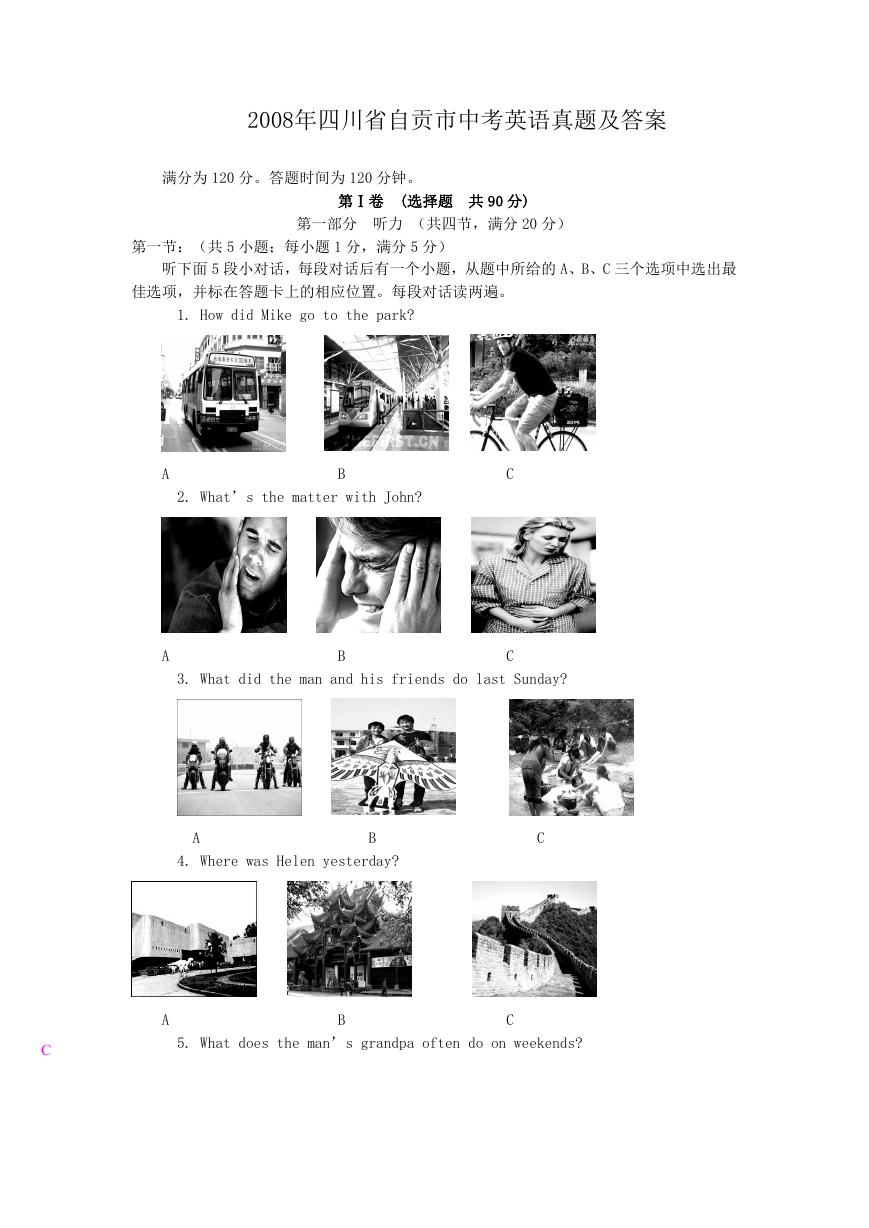
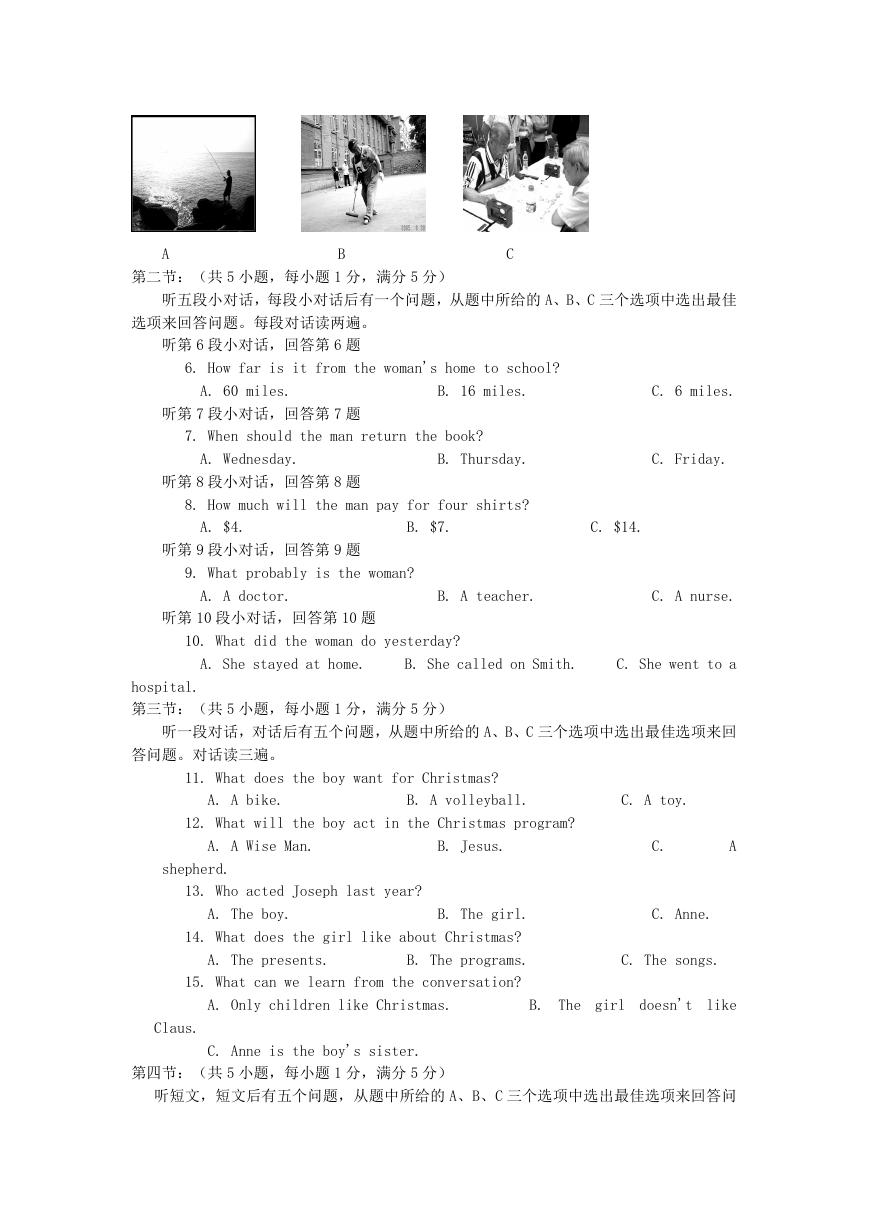
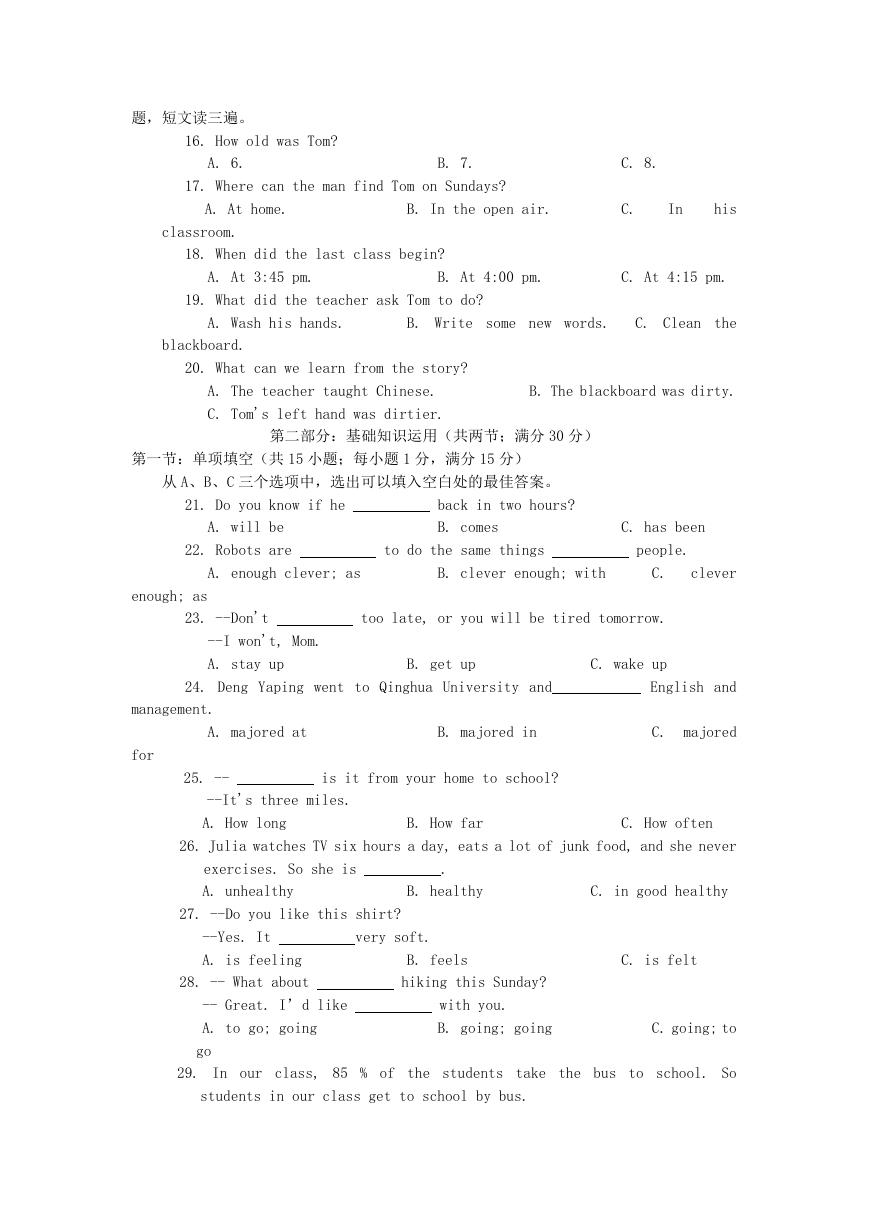
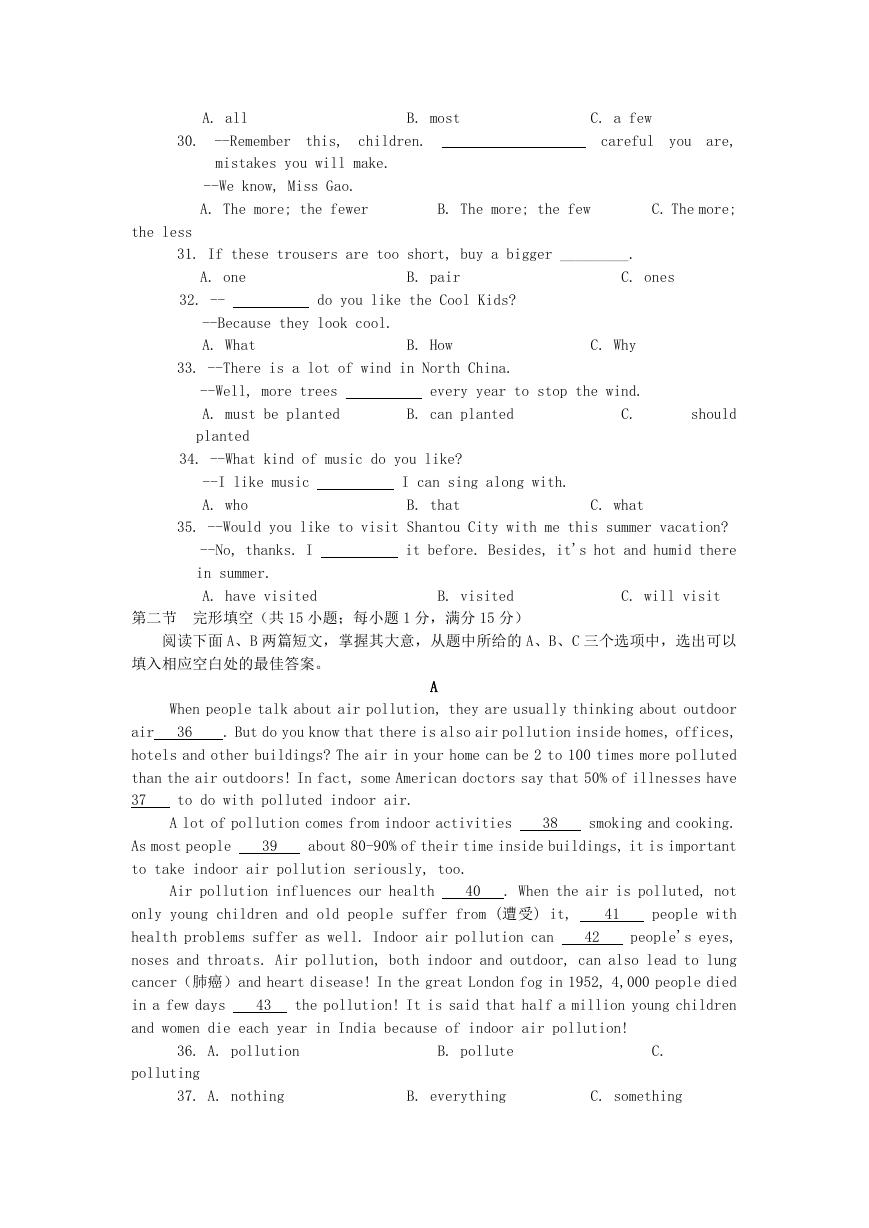

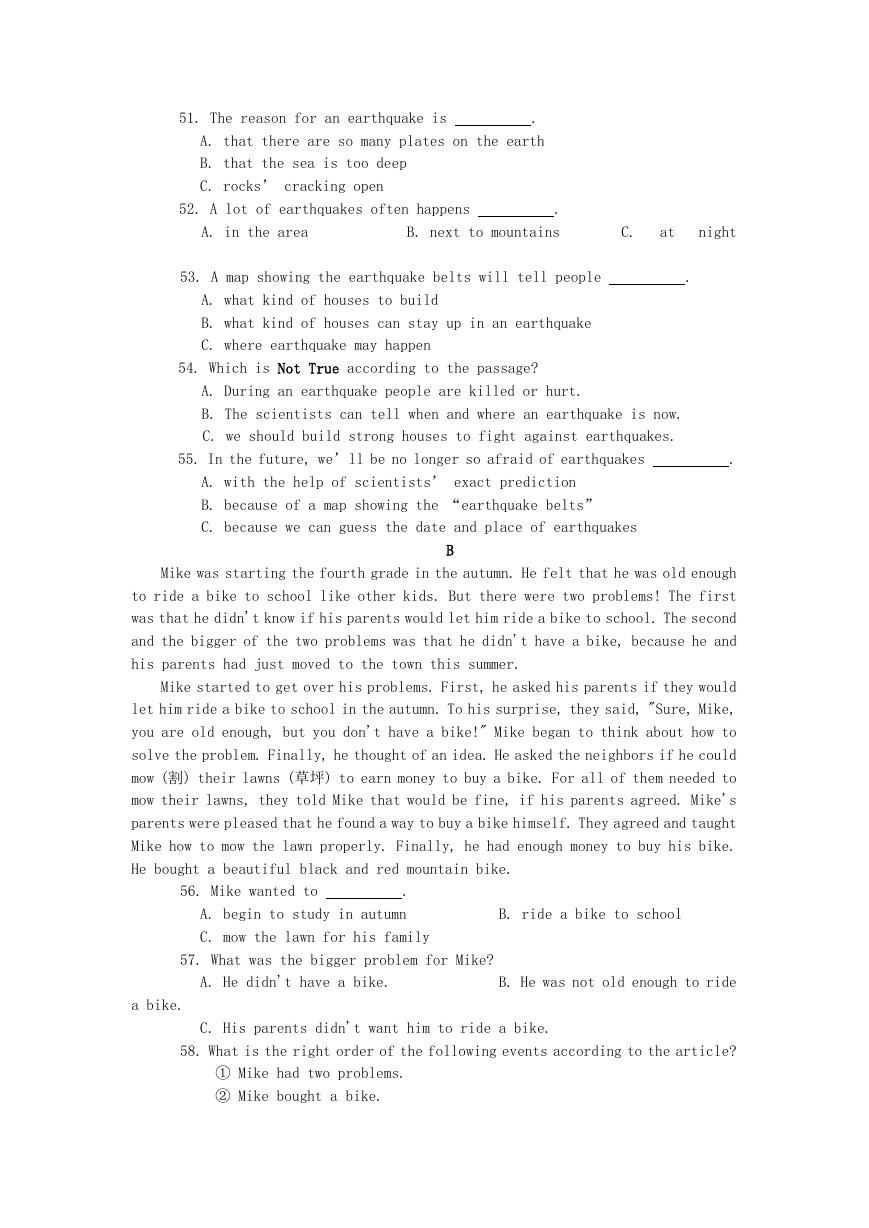
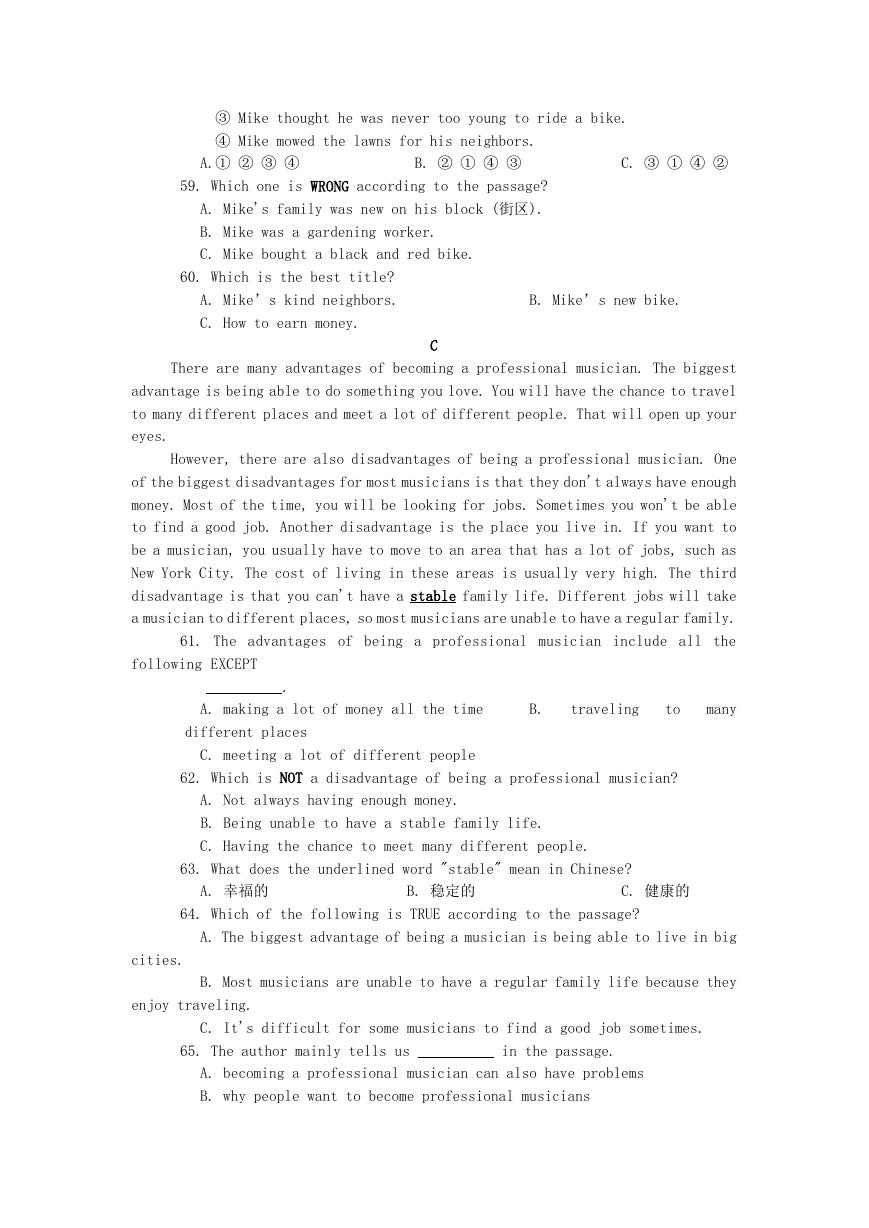
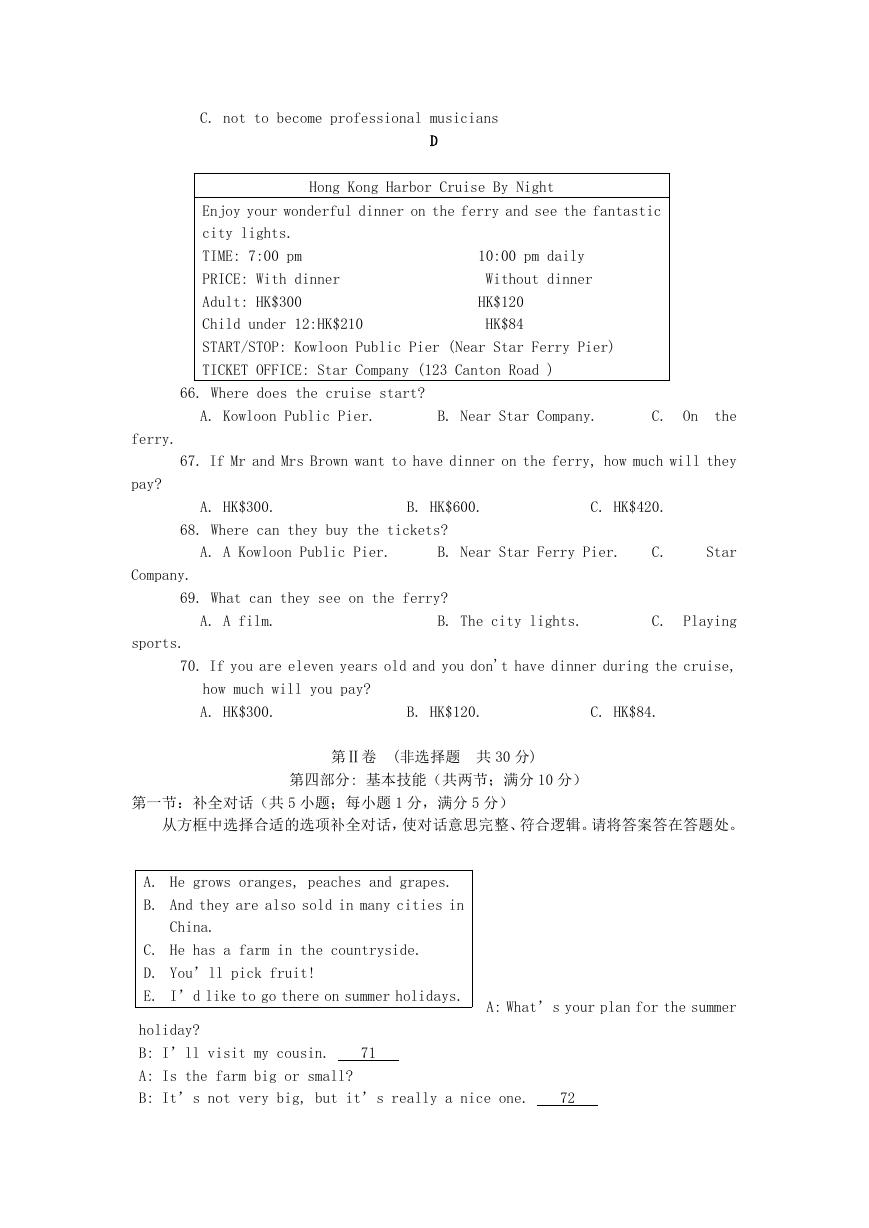








 2023年江西萍乡中考道德与法治真题及答案.doc
2023年江西萍乡中考道德与法治真题及答案.doc 2012年重庆南川中考生物真题及答案.doc
2012年重庆南川中考生物真题及答案.doc 2013年江西师范大学地理学综合及文艺理论基础考研真题.doc
2013年江西师范大学地理学综合及文艺理论基础考研真题.doc 2020年四川甘孜小升初语文真题及答案I卷.doc
2020年四川甘孜小升初语文真题及答案I卷.doc 2020年注册岩土工程师专业基础考试真题及答案.doc
2020年注册岩土工程师专业基础考试真题及答案.doc 2023-2024学年福建省厦门市九年级上学期数学月考试题及答案.doc
2023-2024学年福建省厦门市九年级上学期数学月考试题及答案.doc 2021-2022学年辽宁省沈阳市大东区九年级上学期语文期末试题及答案.doc
2021-2022学年辽宁省沈阳市大东区九年级上学期语文期末试题及答案.doc 2022-2023学年北京东城区初三第一学期物理期末试卷及答案.doc
2022-2023学年北京东城区初三第一学期物理期末试卷及答案.doc 2018上半年江西教师资格初中地理学科知识与教学能力真题及答案.doc
2018上半年江西教师资格初中地理学科知识与教学能力真题及答案.doc 2012年河北国家公务员申论考试真题及答案-省级.doc
2012年河北国家公务员申论考试真题及答案-省级.doc 2020-2021学年江苏省扬州市江都区邵樊片九年级上学期数学第一次质量检测试题及答案.doc
2020-2021学年江苏省扬州市江都区邵樊片九年级上学期数学第一次质量检测试题及答案.doc 2022下半年黑龙江教师资格证中学综合素质真题及答案.doc
2022下半年黑龙江教师资格证中学综合素质真题及答案.doc